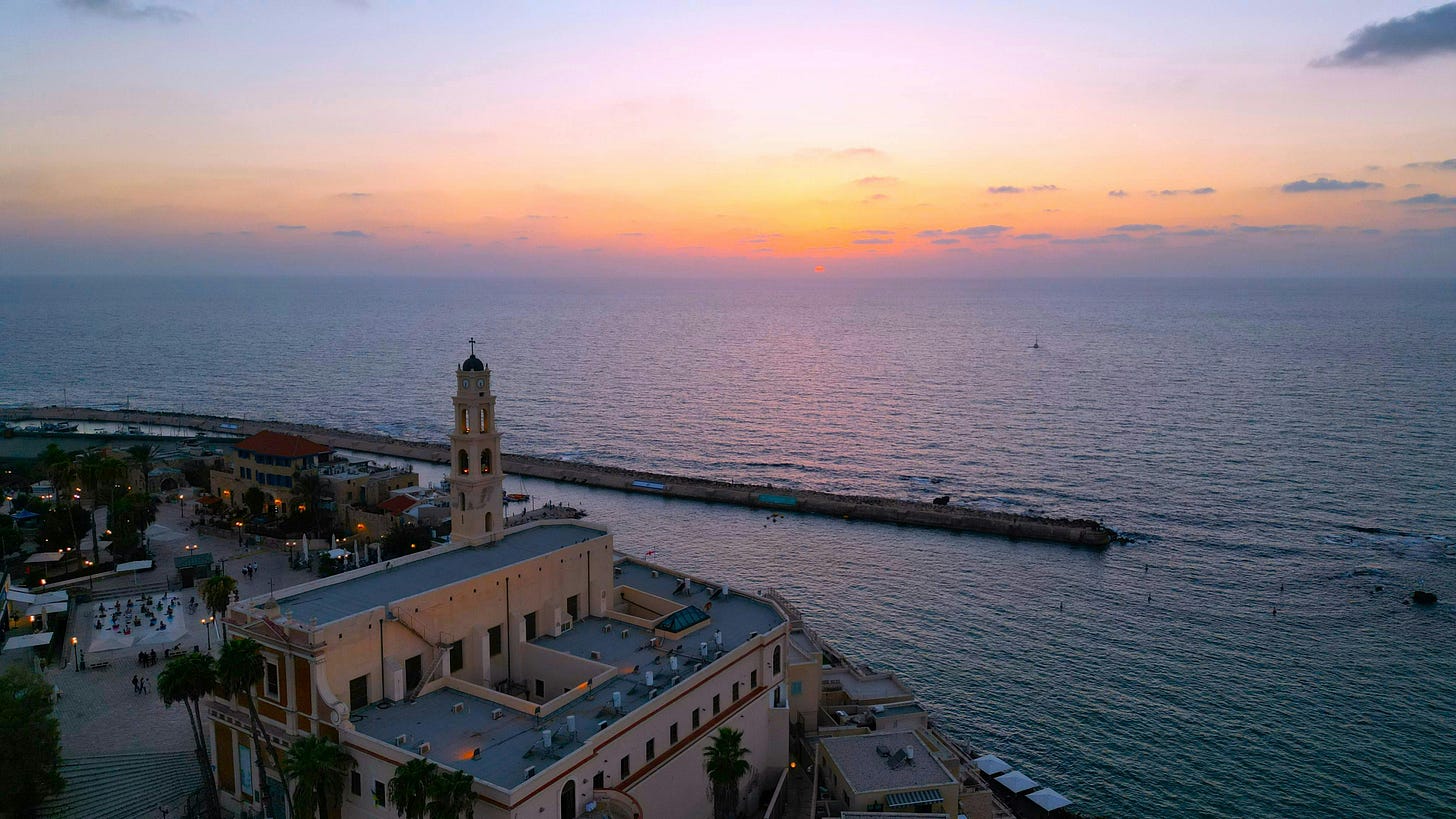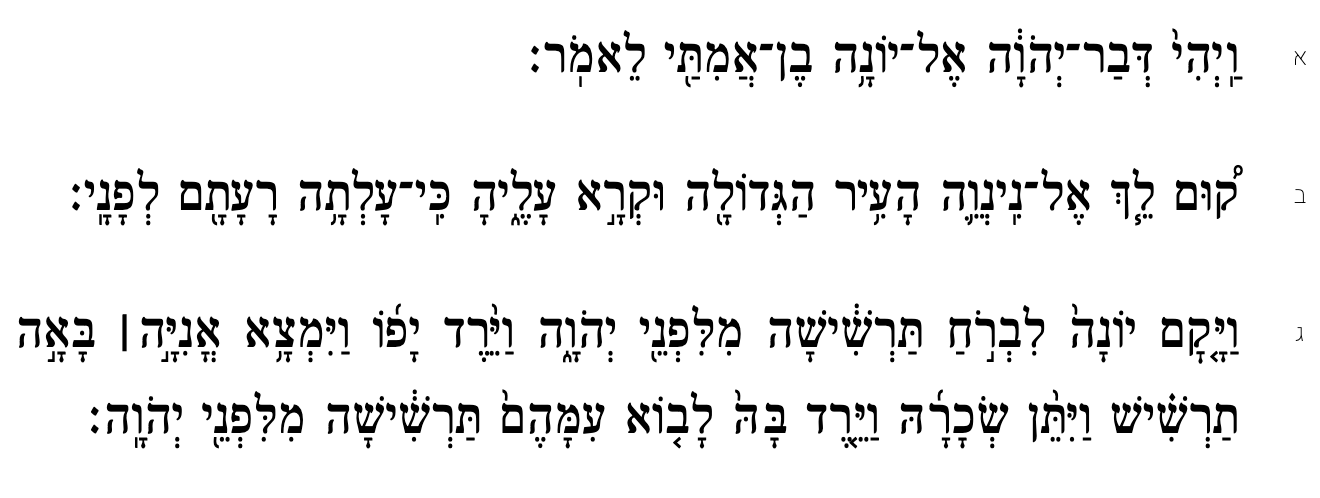Arguing and Accepting | Yona 1:1-3
Finding how to live in the presence of God
Welcome to Gateways, where you experience the Nevi'im—the Prophets—through the teachings of Don Yitzchak Abarbanel, distilled into easy-to-follow lessons.
For today’s lesson, we’ll put Isaiah on pause and dive into something special for Yom Kippur—the book of Yona, the text we read on this holy day.
We’ll look at just the first three verses, but even these opening lines hold insights that can guide us through the rest of the book and make our Yom Kippur more meaningful.
I’ve lightly abridged Abarbanel’s commentary. My additions are in italics, and I’ve used bold to highlight key ideas and make the content easier to follow.
I’ll share Abarbanel’s overview, the verses, his questions and answers, and finally conclude with a short takeaway of my own. I hope you’ll share yours as well.
Jeff
Overview
The general intent of this prophecy, the entire book of Yona, is to make known that the counsel of the Lord stands forever, and the word of our God endures always. Therefore the prophets trusted their prophecies and declared future events, knowing truly that God is not a man to lie.
This was already seen in practice with Yonah son of Amittai, whom God commanded to prophesy not to Israel but to Nineveh, the capital of Assyria. Yonah did not want to go, because he knew the evils and exiles Assyria would bring on the tribes of Israel. He wished instead that Assyria be destroyed, and Nineveh, its capital, wiped out. For this reason he fled. But the Lord, who directs all deeds, sent a storm at sea, until the sailors were forced to throw Yonah, the sinful soul, into the water.
Even there he was not abandoned: the fish that swallowed him guarded him like the pupil of the eye, until Yonah was driven to pray to God. Then He brought him out, and he went to fulfill his mission. For nothing is hidden from the Lord, and all is in His hand, like clay in the hand of the potter, to shape as He wills.
Photo of the Jaffa coast by רון סרפיק
Verses
The word of the Lord came to Yona son of Amitai:
“Rise up—go to the great city of Nineveh and cry out against it, for its cruel evil has come into my sight.”
But Yona rose instead to flee to Tarshish, away from the Lord’s presence. He went down to Yafo, found a ship bound for Tarshish, paid the fare, and went down inside the ship to sail away with them to Tarshish, away from the Lord’s presence.
Questions
First question
Why did God send Yonah to Nineveh? God’s special providence was promised only to Israel—“The Lord’s portion is His people” (Deut. 32:12). Other nations are under the rule of ministering forces, and God never sent prophets to rebuke Egypt, Babylon, or other sinful nations. Why then Nineveh?
Second question
Why did Yonah try to flee from before the Lord? Scripture teaches there is no escaping God’s presence. The sages offered two reasons: (1) because gentiles were quick to repent, and this might shame Israel; (2) because if Nineveh repented, they might say Yonah was a false prophet. But both explanations seem weak, since their repentance itself proved they believed him, and what did it matter to Yonah if they later called him false? Besides, at first God only told him to proclaim their evil, not to announce destruction.
Answers
First Answer
God’s command that Yonah go to Nineveh, “the great city,” was not because of any special providence or love for them, as there is for Israel. Ibn Ezra had suggested that Nineveh was long God-fearing and only recently began to do evil, which is why a prophet was sent. But this is not correct. The meaning of “great city to God” will be explained later.
The true reason is this: Nineveh was the capital of Assyria, the nation decreed to bring punishment on Israel for its sins. God had already determined that Assyria would be the rod of His anger against Samaria and its daughters, as the prophet says: “Woe to Assyria, the rod of My wrath.”
If Nineveh and Assyria were destroyed for their own violence and corruption, they would no longer be able to serve as God’s instrument of judgment.
Therefore, God sought to warn them through Yonah—not to grant them the same divine oversight and providence given to Israel, but to prevent their immediate ruin. By sparing them, they would remain prepared to carry out the destruction of Israel at the appointed time. This is the reason for Yonah’s mission: not because of God’s affection for Nineveh, but so that Assyria would be preserved as the tool of divine punishment.
Second Answer
Yonah understood that if he went to Nineveh and they repented, Assyria would be spared and later become the instrument to destroy Israel. He could not bear to be the cause of saving Israel’s enemies and bringing calamity on his own people.
So he chose to flee from before the Lord—that is, to leave the land of Israel, where prophecy rests, thinking that outside the land prophecy would not come upon him and he would not be forced to deliver the message.
The sages explained that Yonah sought “the honor of the son and not the honor of the Father”—meaning he preferred to protect Israel even at the expense of disobeying God’s command. Like Moses and David, who offered themselves for Israel, Yonah was even willing to perish at sea rather than deliver salvation to Assyria.
His flight was not denial of God’s power—he knew there is no escaping God’s presence—but an attempt to remove himself from the state of prophecy, so he would not be the means of sparing Assyria. In this way the second question is resolved.
Takeaway
A few themes stand out from Abarbanel’s answers.
First, prophecy is bound to the land of Israel. While there are rare exceptions, the central point is the spiritual elevation of the land—it is uniquely suited for God’s presence to rest upon His prophets.
Second, God’s plan encompasses everything, even painful moments like the destruction of the First Temple. We may not always understand why suffering occurs, but we can know how it occurs—through God’s will and design.
Third, Yonah shows us that it can be acceptable, even praiseworthy, to struggle and argue with God. Yet in the end, like Yonah, we must also learn to accept His will.
With these reflections, may we all enter Yom Kippur with deeper faith and acceptance, and may this Yom Kippur greet us in peace.




